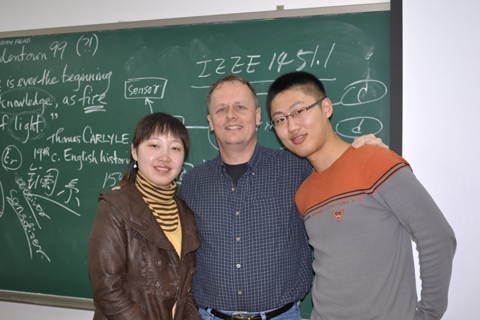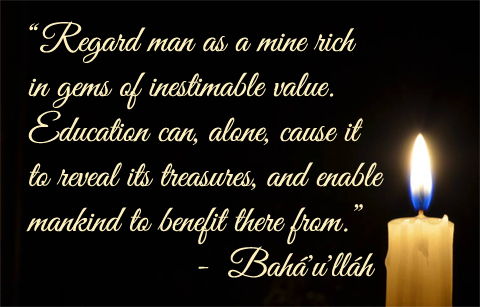|
 February
23, 2021
Back
to School on a Friday Night
February
23, 2021
Back
to School on a Friday Night
 “Call me
biased,” smiled speaker Jay Howden, “but this is the BIGGEST
idea in the whole series!” A long-time high school teacher in Ontario
with five years instructing university students in China, Howden
presented the January 22 episode of the Ottawa Bahá’ís’ “Big Ideas”
program to a virtual audience of about 80.
Called “East
is East, West is West: Education’s Where They Meet”, the talk began
with a contrast: colonial British writer Rudyard Kipling’s discouraged
prediction – “never the twain shall meet” – versus the “dearest wish”
of Bahá’í Exemplar ‘Abdu’l‑Bahá – that “the friends of East and West
[be] in close embrace”. Howden discussed some of the differences
between the Canadian and Chinese education systems: the rigorous,
teacher-centred system in China, epitomized by the famous gao kao high
school leaving examination; and, the student-centred, cover-every-base
Canadian curriculum, based on the uneasy fit between workplace
preparation and the ideal of every student’s potential to achieve anything.
“Call me
biased,” smiled speaker Jay Howden, “but this is the BIGGEST
idea in the whole series!” A long-time high school teacher in Ontario
with five years instructing university students in China, Howden
presented the January 22 episode of the Ottawa Bahá’ís’ “Big Ideas”
program to a virtual audience of about 80.
Called “East
is East, West is West: Education’s Where They Meet”, the talk began
with a contrast: colonial British writer Rudyard Kipling’s discouraged
prediction – “never the twain shall meet” – versus the “dearest wish”
of Bahá’í Exemplar ‘Abdu’l‑Bahá – that “the friends of East and West
[be] in close embrace”. Howden discussed some of the differences
between the Canadian and Chinese education systems: the rigorous,
teacher-centred system in China, epitomized by the famous gao kao high
school leaving examination; and, the student-centred, cover-every-base
Canadian curriculum, based on the uneasy fit between workplace
preparation and the ideal of every student’s potential to achieve anything.
Eastern and Western approaches to schooling do have commonalities with
each other. At times, they even echo the thrilling redefinition of
education offered by Bahá’u’lláh in his prophetic 19th-century mission
and elaborated by his son ‘Abdu’l‑Bahá into the 20th. All place
education at or near the centre of human society. While it is tempting
to think that merely adopting the best of existing models would result
in the perfect synthesis, a global approach requires a higher order of
thinking than that which created problematic existing systems.
Western teaching has evolved, for the past 50 years at least, past the
conception of tabula rasa, that students are “blank
slates”, empty vessels into which information is poured. During
Howden’s career in Ontario, collaborative and interest-based approaches
to education grew, as did the demands on teachers to provide guidance
in areas formerly the job of family or religion: from anti-bullying to
recycling, the “ever-expanding curriculum” that teachers are often
blamed for not delivering adequately. Still, there was plenty of room
for him to infuse language, literature and writing classes with a love
for ideas and the search for truth, challenging and broadening his
mainly small-town students.

A 2009 family move to Dalian brought Howden five years of cultural
learning while teaching in two universities, and a close-up of Chinese
education. The Chinese system with its gao kao (“high test”) fosters
rigorous study both in and outside of the classroom. Students generally
learn in a much more receptive mode than their Western counterparts,
are masters of memorization and teachers are profoundly respected. Tens
of millions have been educated out of poverty, and incredible
scientific and technical prowess has rapidly been achieved, fuelling
China’s global emergence. Howden shared poignant insights of student
friends who broadened their education by studying the “Ruhi Institute”
materials on Bahá’í wisdom, practices and avenues of service. They were
hungry for knowledge, and their discipline was remarkable.
Howden’s conclusion was threefold. First, Bahá’í teachings on human
nature, and the scope and purpose of education, are revolutionary.
Human beings “are mines rich in gems of inestimable value”, in need of
learning methods that not only respect material (subsistence needs) and
human education (all the arts and sciences and crafts), but also divine
education: spiritual awareness and deep morality. What’s more, the
purpose of learning is to bring about progressively higher forms of
unity; according to Bahá’u’lláh, this is also the
purpose of justice. Universal education becomes not
just a benevolent human right, but a planetary necessity.
Second – the biggest idea – is the sweeping Bahá’í
view of history. Mankind’s social evolution has been guided by divine
Educators, spiritually gifted souls that have always, and everywhere,
impelled the advance of human civilization. Some we know; many we
don’t. But from Abraham, Buddha, Jesus Christ and Muhammad, to the
“Peacemaker” or the Seven Grandfathers of North American Indigenous
traditions, every tribe and nation has been taught.
Education is the very pattern of our collective advancement.
Finally, guided especially by the precepts of Bahá’u’lláh – whether we
recognize it or not – humanity is learning how to unite
itself. Create justice. Eliminate prejudices, economic extremes.
Harmonize rationality and spirituality. Uplift everyone via a complete
and coherent vision of education. These are the requirements as we
conceive and achieve the oneness of humanity.
|
|


